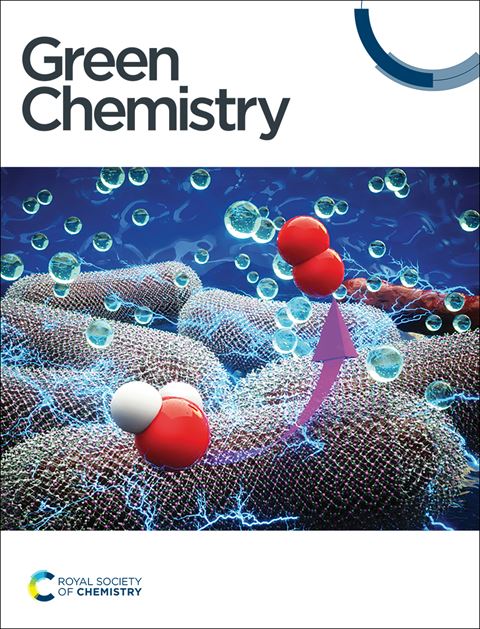利用无金属光催化系统从生物质衍生的乙酰丙酸制备甲乙酮及生命周期评估研究
IF 9.3
1区 化学
Q1 CHEMISTRY, MULTIDISCIPLINARY
引用次数: 0
摘要
乙酰丙酸(LA)来源于木质纤维素生物质,可通过各种化学转化生产高价值化学品。然而,关于左旋乙烯酸中 C-C 键裂解的研究还很有限。甲基乙基酮(MEK)是一种具有广泛工业用途的优质溶剂,传统上由石油衍生的正丁烯生产。在此,我们报告了一种利用无金属光催化系统从 LA 生产 MEK 的方法。利用吖啶化合物作为光敏剂,噻吩酚作为氢转移试剂,在温和的反应条件下实现了 MEK 的高选择性和高产率,并且利用微通道连续流光反应器大大缩短了反应时间。此外,生命周期评估表明,这种方法的碳排放量低于其他利用 LA 生产 MEK 的方法。该催化系统为从生物基平台分子 LA 生产 MEK 提供了一种绿色高效的方法,符合可持续发展的要求。本文章由计算机程序翻译,如有差异,请以英文原文为准。


Preparation of methyl ethyl ketone from biomass-derived levulinic acid using a metal-free photocatalytic system and life cycle assessment study†
Levulinic acid (LA) is derived from lignocellulosic biomass and can undergo various chemical transformations to produce high-value chemicals. However, there are limited studies on C–C bond cleavage in LA. Methyl ethyl ketone (MEK) is a high-quality solvent with a wide range of industrial applications, traditionally produced from petroleum-derived n-butene. Here, we report a method for the production of MEK from LA using a metal-free photocatalytic system. Using acridine compounds as photosensitizers and thiophenols as hydrogen transfer reagents, high selectivity and yield of MEK are achieved under mild reaction conditions, and the reaction time is significantly shortened using a microchannel continuous flow photoreactor. Additionally, life cycle assessment indicates that this method has lower carbon emissions than other MEK production methods from LA. This catalytic system provides a green and efficient method to produce MEK from bio-based platform molecule LA, which meets the requirements of sustainable development.
求助全文
通过发布文献求助,成功后即可免费获取论文全文。
去求助
来源期刊

Green Chemistry
化学-化学综合
CiteScore
16.10
自引率
7.10%
发文量
677
审稿时长
1.4 months
期刊介绍:
Green Chemistry is a journal that provides a unique forum for the publication of innovative research on the development of alternative green and sustainable technologies. The scope of Green Chemistry is based on the definition proposed by Anastas and Warner (Green Chemistry: Theory and Practice, P T Anastas and J C Warner, Oxford University Press, Oxford, 1998), which defines green chemistry as the utilisation of a set of principles that reduces or eliminates the use or generation of hazardous substances in the design, manufacture and application of chemical products. Green Chemistry aims to reduce the environmental impact of the chemical enterprise by developing a technology base that is inherently non-toxic to living things and the environment. The journal welcomes submissions on all aspects of research relating to this endeavor and publishes original and significant cutting-edge research that is likely to be of wide general appeal. For a work to be published, it must present a significant advance in green chemistry, including a comparison with existing methods and a demonstration of advantages over those methods.
 求助内容:
求助内容: 应助结果提醒方式:
应助结果提醒方式:


